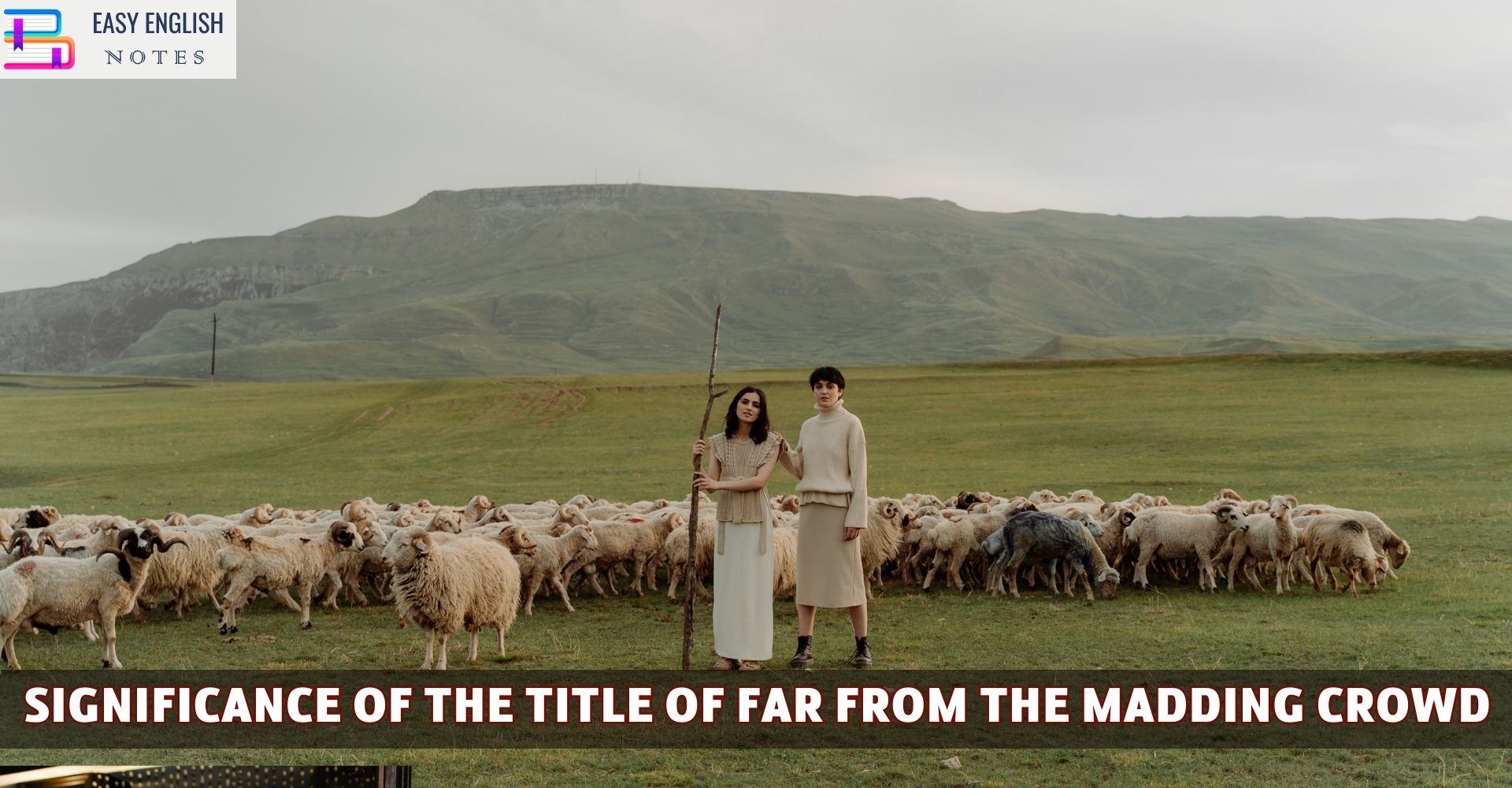Thomas Hardy’s choice of the title “Far From the Madding Crowd” immediately evokes Gray’s famous poem, “Elegy Written in a Country Churchyard.” In Gray’s lines, the phrase “Far from the madding crowd’s ignoble strife” paints a picture of tranquillity, with those laid to rest in rural graves free from the noise and tumult of city life. However, Hardy’s use of this title is laced with satire and irony. While the novel is undoubtedly set in the countryside, it doesn’t portray the serene and unspoiled rural existence suggested by Gray’s elegy. Instead, it delves into the complexities of love and relationships within the rustic setting.
The title of the novel Far From the Madding Crowd reminds the readers of the most popular poem, Gray’s Elegy Written in a Country Churchyard. The exact line in the poem is as follows:
Far from the madding crowd’s ignoble strife,
Their sober wishes never learned to stray;
Along the cool, sequestered vale of life,
They kept the noiseless tenor of their way.
These lines tell us that the forefathers of the village, lie in their graves in the most peaceful atmosphere of the countryside. But Hardy has borrowed this title from this poem in a satirical or ironic manner. Of course, the atmosphere of the novel is rural; all the incidents and events of the novel occur in the rural surroundings. The theme of the novel is love but the courting and wooing are carried in the rural atmosphere.
The novel’s narrative takes place almost entirely in villages and rural locales. From the outset, we find ourselves in the village of Weatherbury, which serves as the backdrop for many pivotal events. Bathsheba’s farm, a central location, is nestled in the countryside, surrounded by rolling hills and fields. Even the Malthouse, where the rustic characters gather for merriment, is situated in the rural landscape of Wessex. The sole exception to this predominantly rural setting is the city of Bath, where Bathsheba clandestinely marries Troy. Nevertheless, apart from this brief interlude, the story unfolds entirely within the village setting.
The characters in the novel are also primarily rustic figures. They are farmers, shepherds, and other individuals deeply rooted in the agrarian way of life. Bathsheba, Gabriel Oak, and Boldwood are all peasants, intimately connected to the land they cultivate. Gabriel Oak, for instance, is a shepherd, while Boldwood is a farmer. Bathsheba herself is the owner of a farm, and her life revolves around the rhythms of rural existence. The one character who deviates from this pattern is Troy, who possesses a degree of education and culture but willingly embraces rural life, even though he has prior military experience and has resided in the city of Bath. Minor characters like the Malster, Poorgrass, Jan, and Coggan embody the rustic spirit, their behavior and language reflecting the rural milieu. Some characters are so isolated from urban life that they’ve never seen a railway engine or a motor car, further emphasizing their rustic identity.
Also Read :
- Compare Hamlet with Macbeth, Othello and other Tragedies
- “The Pardoner’s Tale” is the finest tale of Chaucer
- Prologue to Canterbury Tales – (Short Ques & Ans)
- Confessional Poetry – Definition & meaning
- Line By Line Explanation Of The Poem The Eve of St. Agnes
Beyond the characters and scenes, the novel abounds with rural imagery and customs. We witness pastoral scenes like Gabriel Oak’s sheep grazing, the annual sheep shearing on Bathsheba’s farm, and the harvest feast, all of which immerse us in the rhythms of rural life. Events like the devastating fire at Bathsheba’s farm further reinforce the novel’s rural ambiance.
“Far From the Madding Crowd” is a masterpiece of rural landscape painting in words. Hardy’s vivid descriptions create a vivid and panoramic backdrop for the story. For instance, in the second chapter, he conjures a picturesque image of Norcombe Hill:
“Norcombe Hill,” not far from lonely Toller-Down, was one of those hilly landscapes that could make a passerby feel as though they were in the presence of something nearly indestructible. It was a gently rolling hill covered in chalk and soil, a typical example of those smoothly contoured features of the earth that might remain undisturbed even during a cataclysmic event when grander heights and towering granite cliffs crumbled.
In these passages, Hardy captures the essence of the rural landscape, highlighting its timeless and enduring quality. His skillful use of language paints a vivid portrait of the countryside, enhancing the reader’s immersion in the story.
In conclusion, “Far From the Madding Crowd” is a novel deeply rooted in the rural landscape, where characters and scenes are intricately interwoven with the countryside. While Hardy’s use of the title may initially suggest an idyllic rural existence, the novel’s exploration of love and human relationships within this rustic setting is far more complex. Through his characters and vivid descriptions, Hardy invites readers to immerse themselves in the enduring beauty and challenges of rural life, ultimately creating a timeless ode to the countryside.
PLEASE HELP ME TO REACH 1000 SUBSCRIBER ON MY COOKING YT CHANNEL (CLICK HERE)











